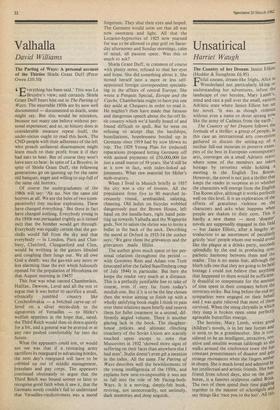Valhalla
David Williams
Everything has been said.' This was La Bruyere's view; and certainly Shiela Grant Duff bears him out in The Parting of Ways. The miserable 1930s are by now well documented — documented to death, some might say. But this would be mistaken, because not many can believe without per- sonal experience; and so, as history does in considerable measure repeat itself, the under-sixties ought to read this book. The CND-people with their adherents of the left who preach unilateral disarmament might learn much to their profit, from it if they had ears to hear. But of course they won't have ears to hear. In spite of La Bruyere, in spite of Shiela Grant Duff, the following generations go on queuing up for the same old banquet, eager and willing to sup full of the same old horrors.
Of course the undergraduates of the 1980s will say: `Ah no. Not the same old horrors at all. We are the heirs of two (com- paratively) tiny nuclear explosions. These have changed everything.' But these in fact have changed nothing. Everybody young in the 1930s was persuaded (rightly as it turned out) that the bomber would get through. Everybody was equally certain that the gas- shells would fall from the sky and that everybody — in London, Paris and Clun- bury, Clunford, Clungunford and Clun, would be writhing in the gutters blinded and coughing their lungs out. We all owe God a death: was the gas-exit any more or less alarming than the exit which hideously opened for the population of Hiroshima on that August morning in 1945?
This fear was what caused Chamberlain, Halifax, Dawson, Laval and all the rest to argue that it was better to sacrifice a small, ethnically jumbled country like Czechoslovakia — a botched carve-up of- fered on a silver entrée-dish to the signatories of Versailles — to Hitler's wolfish appetites in the hope that, sated, the Third Reich would then sit down quietly for a bit, and a general war be averted or at any rate pushed comfortably far into the future.
What the appeasers could not, or would not see was that if a retreating army sacrifices its rearguard to advancing hordes, the next day's rearguard will have to be cobbled up out of middle management, brasshats and pay corps. The appeasers continued obstinately to argue that the Third Reich was bound sooner or later to recognise good faith when it saw it, that the Germans surely couldn't fail to understand that Versailles-vindictiveness was a mood forgotten. They shut their eyes and hoped. The Germans would soon see that all was now sweetness and light. All that the Locarno-hypocrites of 1925 now yearned for was to be allowed to play golf on Satur- day afternoons and Sunday mornings, calm of mind, all passion spent. Was this so much to ask?
Shiela Grant Duff, in common of course with plenty more, refused to shut her eyes and hope. She did something about it. She turned herself into a more or less self- appointed foreign correspondent specialis- ing in the affairs of central Europe. She wrote a Penguin Special, Europe and the Czechs. Chamberlain ought to have put one day aside at Chequers in order to read it. He mightn't then have made that fatuous and dangerous speech about the far-off lit- tle country which we'd hardly heard of and found difficult to spell. But he went on refusing to accept that the hardships, humiliations, hopelessness bottled up in Germany since 1919 had by now blown its top. The 1929 Young Plan for (reduced) reparations proposed letting Germany off with annual payments of £50,000,000 for just a small matter of 59 years. She'd still be at it now in fact, with index-linked ad- justments. What raw material for Hitler's mob-oratory.
When I lived in Munich briefly in 1937 the city was a city of loonies. All the population from five to 90 marched in- cessantly round, armbanded, saluting, chanting. Old ladies on bicycles wobbled dangerously past the Brown House, left hand on the handle-bars, right hand poin- ting up towards Valhalla and the Wagnerite gods. Not to salute the shrine was to invite a bullet in the back of the neck. Describing the mood at Oxford in 1933-34 the author says: 'We gave them the grievances and the grievances made Hitler.
The author gives much space to her per- sonal relations throughout the period with Goronwy Rees and Adam von Trott (executed after the failed Stauffenberg coup of July 1944) in particular. But here she keeps the reader very much at a distance. This is a perfectly justifiable line to take of course, even if very far from today's modish one. But if it is to be the line chosen then the writer aiming to finish up with a wholly satisfying book ought I think to pass over these relations more briefly and reserve them for fuller treatment in a second, dif- ferently angled volume. There is another glaring lack in the book. The slaughter- house policies and ultimate clinching treachery of the Soviet Union are scarcely touched upon except to note that Muscovites in 1932 'showed more signs of suffering on their faces than anywhere else I had seen'. Stalin doesn't even get a mention in the index. All the same The Parting of Ways describes well the bewilderments of the young intelligentsia of the 1930s, and explains how next-to-impossible it was not to fall into the role of Mr Facing-both- Ways. It is a moving, deeply-felt book, reviving, not unnecessarily, not untimely, dark memories and deep anguish.


































 Previous page
Previous page